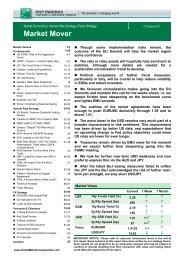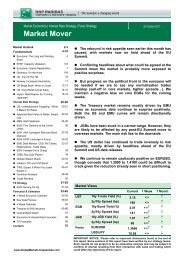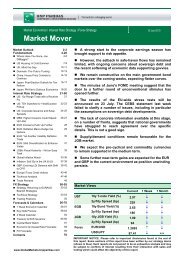MARKET MOVER - BNP PARIBAS - Investment Services India
MARKET MOVER - BNP PARIBAS - Investment Services India
MARKET MOVER - BNP PARIBAS - Investment Services India
Create successful ePaper yourself
Turn your PDF publications into a flip-book with our unique Google optimized e-Paper software.
Spain: Inching Closer to a Request for Aid<br />
• Spain is inching closer to asking for financial<br />
aid, but it is still only inching.<br />
• In the latter half of next week, Spain will have<br />
an action-packed agenda. It will present its 2013<br />
budget, announce its planned structural reforms<br />
and publish the result of the bottom-up bank audit.<br />
• Any subsequent bailout could be marketed as<br />
a reward for reform and potentially remove part of<br />
the stigma attached to a bailout.<br />
• The country’s regional elections on 21 October<br />
could be the last obstacle to a request.<br />
• Any unused funds from the bank bailout could<br />
be used to lower the final cost of a sovereign<br />
bailout, something that should please Germany.<br />
The timetable seems clearer<br />
After last weekend’s Ecofin meeting and confirmation<br />
of the publication date of the bottom-up review of the<br />
Spanish banks, the timeline of and next steps<br />
towards a Spanish aid request seem to be clearer.<br />
After the Eurogroup meeting, Spanish Economic<br />
Minister Luis de Guindos said Spain would present<br />
its 2013 budget on 27 September. The day after, the<br />
Spanish government will present its planned<br />
structural reforms and, more importantly, the results<br />
of the bottom-up audit of the Spanish banks.<br />
The next Ecofin meeting on 8 October will assess the<br />
reforms and the budget, as well as the details of the<br />
bank reforms to be undertaken as soon the first<br />
tranches of the bank bailout funds are released.<br />
Comments over the weekend suggest that the<br />
reforms and budget have been drafted with some<br />
knowledge or help from the IMF and the European<br />
Commission. Indeed, IMF chief Christine Lagarde<br />
confirmed that an IMF team has been in Madrid<br />
since early last week, helping on the 2013 budget.<br />
First the reforms, then the support<br />
So, as things currently stand, Spain seems to be<br />
already negotiating the conditions under which it<br />
might receive financial aid. Spain will only request<br />
help after it has put in place the reforms required by<br />
the Troika, as it would be easier to sell domestically.<br />
ESM and ECB support will be seen more as a<br />
reward for the government’s efforts and less as a<br />
punishment for fiscal laxity.<br />
The big question is the exact timing. As Spain will<br />
face its biggest liquidity squeeze at the end of<br />
October, when EUR 20bn of bonds mature, Spain<br />
still has some time to play. But it is not unlimited and<br />
there are several factors that could influence the<br />
timing of a request.<br />
France and Italy are among those countries with the<br />
bigger interest in Spain asking for aid before the EU<br />
summit on 18-19 October. Germany, in contrast,<br />
would prefer, for domestic reasons, to postpone any<br />
Spanish bailout, especially as Spain will first receive<br />
the initial tranches of its bank recapitalisation funds.<br />
And Spanish Prime Minister Mariano Rajoy seems<br />
more inclined to wait until after the 21 October<br />
regional elections in Galicia and the Basque country.<br />
The latter is not an issue, as his Partido Popular has<br />
little chance of winning there anyway. But Galicia is<br />
Mr Rajoy’s home region and according to the latest<br />
polls, the PP could lose its control. A request before<br />
that vote would be a bitter blow to the campaign and<br />
would be seen as a personal defeat for Mr Rajoy.<br />
Recent comments by members of his party suggest<br />
that Mr Rajoy may be increasingly isolated in his<br />
position, though. So, Spain could end up asking for<br />
support before the elections on 21 October, but after<br />
the Ecofin meeting on 8 October.<br />
Bank bailout funds to soften German resistance<br />
The EU has already set aside EUR 100bn for a<br />
programme to recapitalise the Spanish banks and,<br />
according to the latest reports, their capital needs<br />
may be just EUR 60bn, leaving EUR 40bn over.<br />
Media reports suggest that one possibility could be<br />
for Spain to transfer its unused bank bailout money<br />
to the government. This would please Germany, as it<br />
could be done by changing the MoU for the bank<br />
bailout and would not require parliamentary approval.<br />
However, beyond any possible legal objections, for<br />
ECB intervention to occur, a country either has to be<br />
under a “full programme” or have requested a<br />
precautionary one. So, even if Spain were to go<br />
down this route and the other European countries<br />
were to agree, a new MoU would have to be signed,<br />
with all of the conditions that go with it. And this<br />
might not be enough. Spain’s funding needs for the<br />
next 12 months are close to EUR 180bn. If an ESM<br />
programme were to fund only 50% of Spanish<br />
issuance, this would mean it would need a capacity<br />
of close to EUR 90bn, far more than the EUR 40bn<br />
that might be left over from the bank bailout.<br />
So, the most likely scenario, in our view, is that Spain<br />
will still have to request further financing, even if the<br />
unused bank-bailout funds can be transferred. And<br />
despite having some time left, we think Spain will<br />
request support in October.<br />
Ricardo Santos 20 September 2012<br />
Market Mover<br />
9<br />
www.GlobalMarkets.bnpparibas.com
















